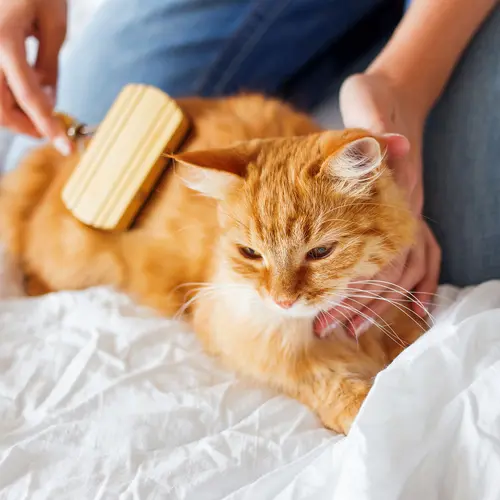Most dog owners are familiar with the risk of heartworm to their pets. Dogs are the primary host of this dangerous parasite and the most likely to get sick from them, but they aren't the only animals at risk. Cats can also get heartworm infections, as can ferrets and wild animals such as coyotes, foxes, and wolves. Very rarely, humans get heartworms.
Heartworm develops differently in cats than in dogs. Cats may not show symptoms for a long time after being infected. When they do, they typically develop a condition called heartworm associated respiratory disease (HARD).
How Do Cats Get Heartworms?
The only way that animals contract heartworm is through mosquito bites. The bloodsucking insects acquire the immature form of the parasites from biting an infected animal, like a dog, fox, or coyote. Once the worms are in the mosquito, they mature over the next 10 to 14 days. If a mosquito bites another animal at that point, the heartworms travel through the mosquito's proboscis (the part of their mouth that pierces the skin) and into the other creature's body.
Once the heartworms are in your cat's body, they begin to grow and mature. It usually takes 6 to 8 months for the worms to get to full size, which can be as much as a foot long. The worms can live for years inside an animal, and they can cause significant health problems, and even more, after reaching their full size.
Cats that spend time outdoors have an increased risk of encountering a mosquito that can pass along heartworm. Even indoor cats are at risk for exposure to the illness. Mosquitos can get inside homes and bite pets and humans.
Heartworm is not contagious. Animals cannot pass heartworm to each other through regular contact. They don't shed the parasites in their waste, so a cat's litter box isn't a danger to other animals or people.
What Are the Symptoms of Heartworm in Cats?
As their name suggests, heartworms affect a cat's heart as well as their blood vessels. The parasites make their way through the skin first, then penetrate muscles before migrating into the blood vessels. Once they are in the circulatory system, heartworms travel into the heart and lungs.
Even before heartworms get into a cat's heart itself, they can cause severe damage. The worms are large enough to block blood vessels. The cat's heart has to work harder to move blood through their body. The cat's natural immune reaction to a foreign substance in the body can cause an inflammatory response, though, and sometimes, the immune response is strong enough to get rid of the heartworm infection altogether.
Lung problems are a further risk for cats with heartworms. They may develop heartworm associated respiratory disease (HARD). The symptoms of this condition may be similar to asthma or other respiratory problems in cats. In addition, your cat may develop fluid in their lungs and abdominal cavity. The swelling and excess fluid can cause additional breathing problems.
The symptoms of heartworm in cats include:
- Coughing
- Wheezing
- Vomiting or diarrhea
- Loss of appetite
- Weight loss
Some cats also experience difficulty moving, seizures, or fainting.
What Is the Treatment for Heartworm in Cats?
Heartworm in dogs is treatable, but that is not the case for cats. There is no heartworm medicine for cats. The medications that work for dogs are not safe for cats due to differences in size and biology. Some cats, though, do spontaneously recover from heartworm infection.
If your cat has heartworms, you should discuss your options with your vet. If your cat isn't showing symptoms, your vet may suggest nothing more than periodic testing. If your cat is ill, the vet might offer supportive care such as IV fluid, medication to relieve respiratory symptoms, or antibiotics.
How Do I Prevent Heartworm in My Cat?
Some experts recommend that cats should be tested for heartworm once a year. Early detection allows you and your vet to keep a close eye on your cat and treat any symptoms if they develop. In addition to testing, cats should be taking heartworm preventive medicine.
There are very effective heartworm preventives for cats. These medicines kill any larval heartworms before they can mature and cause damage to your cat's blood vessels. It is important to give your cat the medicine on schedule. Delaying a dose gives parasites time to mature. The preventive medications are not effective on mature heartworms.
Most veterinarians recommend medicines such as selamectin, milbemycin, and ivermectin. You can discuss the best method of heartworm prevention with your vet. Many pet owners give their companions monthly pills to prevent heartworm or topical treatments. Ask your vet what they recommend for your pet.
